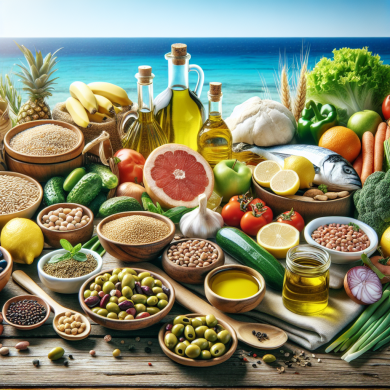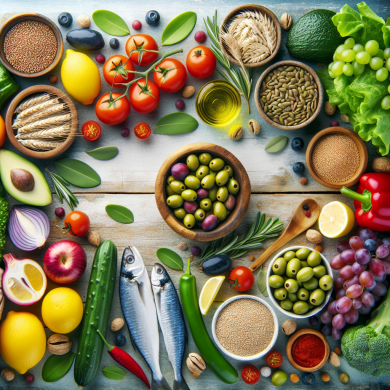Traditional vs. Modern Mediterranean Diet: A Comparison
Introduction
The Mediterranean diet is renowned worldwide for its health benefits and delicious flavors. Rooted in the eating habits of countries bordering the Mediterranean Sea, this diet emphasizes fresh produce, healthy fats, and whole grains. However, as with many traditional practices, the Mediterranean diet has evolved over time, giving rise to what is now known as the modern Mediterranean diet. This article delves into the key differences between the traditional and modern versions of the diet, exploring their health impacts and cultural significance.
The Traditional Mediterranean Diet
Origins and Core Components
The traditional Mediterranean diet is a reflection of the culinary practices of countries such as Greece, Italy, Spain, and southern France during the mid-20th century. This diet is characterized by high consumption of fruits, vegetables, legumes, nuts, and seeds. Whole grains and olive oil are staple components, with olive oil serving as the primary source of fat. Dairy, primarily in the form of cheese and yogurt, is consumed in moderation, while fish and poultry are preferred over red meat. The diet also includes moderate wine consumption, usually during meals.
Nutritional Profile
The traditional Mediterranean diet is rich in monounsaturated fats, primarily from olive oil, and polyunsaturated fats from sources such as fish and nuts. It is low in saturated fats and cholesterol, which is beneficial for heart health. The diet is also high in fiber, antioxidants, and beneficial phytonutrients, which are linked to reduced inflammation and improved metabolic health.
Health Benefits
Numerous studies have demonstrated the health benefits of the traditional Mediterranean diet. It is associated with a lower risk of cardiovascular disease, certain types of cancer, type 2 diabetes, and neurodegenerative diseases. The diet’s anti-inflammatory properties and rich nutrient profile contribute to its protective effects against chronic illnesses.
The Modern Mediterranean Diet
Adaptations and Influences
The modern Mediterranean diet has been influenced by globalization, urbanization, and changing lifestyles. These factors have led to modifications in the traditional dietary patterns. While the core principles remain intact, there is increased consumption of processed foods, refined grains, and added sugars. Additionally, the modern diet often includes a higher intake of red meat and dairy products.
Nutritional Alterations
The modern Mediterranean diet tends to have a higher caloric density due to increased consumption of processed foods and sugary beverages. This shift has led to a decrease in the intake of essential nutrients and an increase in unhealthy fats and sugars. The fiber content is also reduced compared to the traditional diet, potentially impacting digestive health.
Health Implications
The alterations in the modern Mediterranean diet can potentially negate some of the health benefits associated with its traditional counterpart. Increased consumption of processed foods and sugars is linked to a higher risk of obesity, cardiovascular disease, and metabolic disorders. However, when the modern diet retains its emphasis on whole foods and healthy fats, it can still offer significant health benefits.
Comparative Analysis
Dietary Patterns
The traditional Mediterranean diet is predominantly plant-based, with a focus on seasonal and locally sourced foods. Meals are prepared using simple cooking methods, preserving the natural flavors and nutrients. In contrast, the modern Mediterranean diet may incorporate more convenience foods and global culinary influences, leading to a more diverse but less nutrient-dense dietary pattern.
Cultural and Lifestyle Factors
The traditional Mediterranean diet is deeply rooted in cultural practices and social interactions. Meals are often shared with family and friends, emphasizing community and leisurely dining experiences. This social component contributes to overall well-being and stress reduction. The modern diet, influenced by fast-paced lifestyles, may lack these cultural elements, potentially impacting mental health and social cohesion.
Environmental Considerations
The traditional Mediterranean diet is inherently sustainable, with a low environmental impact due to its reliance on locally sourced and plant-based foods. The modern diet, with its increased consumption of meat and processed foods, may have a larger carbon footprint and contribute to environmental degradation. Embracing the sustainable aspects of the traditional diet can promote both personal and planetary health.
Practical Recommendations
Embracing the Best of Both Worlds
To maximize the health benefits of the Mediterranean diet, individuals can adopt a balanced approach that incorporates the strengths of both the traditional and modern versions. This involves prioritizing whole, unprocessed foods, and healthy fats while allowing for occasional indulgence in modern culinary influences.
Focusing on Quality and Variety
Emphasizing quality over quantity is crucial in both traditional and modern Mediterranean diets. Selecting high-quality olive oil, fresh produce, and sustainably sourced fish can enhance the nutritional value of meals. Incorporating a variety of fruits, vegetables, and whole grains ensures a diverse nutrient intake, supporting overall health.
Mindful Eating Practices
Adopting mindful eating practices, such as savoring each bite and enjoying meals in a relaxed setting, can enhance the dining experience and promote better digestion. This approach encourages individuals to be more attuned to hunger and satiety cues, reducing the likelihood of overeating.
Conclusion
The Mediterranean diet, whether traditional or modern, offers a wealth of health benefits when adhered to thoughtfully. While the traditional diet boasts a rich cultural heritage and robust health advantages, the modern version provides flexibility and adaptability to contemporary lifestyles. By embracing the core principles of the Mediterranean diet—emphasizing whole foods, healthy fats, and mindful eating—individuals can enjoy a delicious and sustainable approach to nutrition that promotes both personal well-being and environmental health.















Add comment